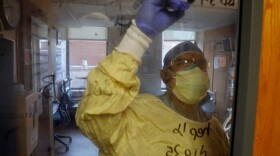
Will Stone
Will Stone is a former reporter at KUNR Public Radio.
-
Some hospitals report less strain as omicron seems to cause less severe illness. But they're still overcrowded with patients. Research shows death rates rise significantly when hospitals are full.
-
Researchers are looking at data from U.S. cases to determine if the variant causes milder disease. Even if the answer is yes, they say, rates of hospitalization could be high during the surge.
-
Scientists are trying to figure out why the omicron variant is spreading so much faster than delta did. Early research provides a few possible reasons.
-
The burning questions: What makes this newly identified variant so transmissible? And what does it mean for preventing spread?
-
President Biden has rolled out a plan to help hospitals deal with omicron and the expected surge of patients. Experts say the support is welcome, but still doesn't go far enough.
-
Understaffed hospitals are already coping with increased patient demand heading into the holidays. They have few options to expand if omicron creates a huge new wave of COVID patients.
-
U.S. hospitals have a heads-up on omicron, but that doesn't mean they feel ready to deal with what could be a huge wave of patients infected by the new variant of COVID-19.
-
Many U.S. hospitals are already struggling with a wave of COVID-19 patients and now they are also racing to prepare for the omicron variant, which threatens to further accelerate hospitalizations.
-
Health care workers in the U.S. are eyeing the omicron variant of COVID-19 while the delta variant continues to put hospitals under stress.
-
The variant has spread through South Africa with remarkable speed — and been detected in at least 60 other countries. Specialists are trying to figure out the next stage for this unwelcome variant.




